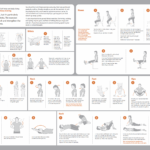UBC Okanagan research shows strength training is effective
Physical exercise may not be top of mind for older adults during the COVID-19 outbreak. But according to one UBC Okanagan researcher, strength training can be an effective way to stay healthy while at home.

Jennifer Jakobi, professor in the School of Health and Exercise Sciences
Nathan Skolski, UBC Okanagan campus May 4, 2020
A recent study from UBCO professor Jenn Jakobi shows that strength training with free-weights that progresses in intensity is effective in combating declining health often observed with adult aging.
“Inactivity and social isolation are key contributors to age-related frailty,” says Jakobi. “While social isolation is a complex challenge these days, there is absolutely some work we can do on enhancing exercise at home.”
She adds that physical movement and exercise, inclusive of weight training, can be readily adapted for the home but advises that anyone looking to start a new exercise program should consult with their physician first.
Jakobi, a professor in UBC Okanagan School of Health and Exercise Sciences, defines frailty as reduced function and health in older adults. Features include unintentional weight loss, slow walking speed, muscle weakness, fatigue and low activity levels. If left unchecked this may lead to declines in health and functional independence which might require longer-term care.
“Age isn’t necessarily always associated with being frail, and frailty isn’t reserved for just old age—it can occur at any point in adulthood,” says Jakobi. “Yet, it is dynamic and can be reversed. Maintaining and building muscle strength is key.”
Jakobi and her research team wanted to explore whether progressive-resistance exercises can be effective at altering the path to this vulnerability.
After an initial screening of 53 older adults, the lab-based study evaluated 21 pre-frail women over the age of 65, divided into two groups. One group participated in a progressively intense free weight exercise program three-times-a-week for 12 weeks. Their exercises mimicked movements of normal life, and which may become difficult for some as they age.
“For example, we asked participants to complete a series of squats, replicating sitting-down and standing up,” explains Nick Bray, former UBCO graduate student and co-author of the study. “We also asked them to perform dead-lifts, which mimic picking-up groceries.”
The other group simply maintained their normal routines.
Measurements of muscle strength and performance were compared between the groups after the 12-week session. Not only did the exercise group improve their muscle performance and become less frail, they did so without injury.
“The exercise group improved in all measures including walking speed, grip strength and sit-to-stand time,” says Jakobi. “Also, these changes were seen as early as nine weeks into the program.”
She adds that their findings dispel the myth of strength training being unsuitable for pre-frail older adults.
“Traditionally, older adults opt for low-intensity, and low-resistance exercise because they believe that heavy free-weight exercise isn’t right for them. Our findings show the opposite.”
Although the research into heavy resistance training is novel and in its early phases this style of exercise is showing great promise. None of the exercise participants opted-out of the program or reported negative events and all improved in functional movement.
To help those interested in using this new research in their home during this period of physical distancing, Jakobi and her team have created an exercise worksheet and other at-home resources that highlight beginning phases of these progressive movements.
“This type of activity is appropriate and can be enjoyable,” says Jakobi. She suggests just going for it.
“Try something new and lift progressively more. You should feel a good healthy challenge.”
| This study was recently published in The Journal of Frailty and Aging and was funded by the Canadian Institutes of Health Research. |
 Source UBC Okanagan campus
Source UBC Okanagan campus
Stay-at-Home-Exercises-FINAL-UBC
At Home Strength Exercises During Period of Social Distancing [PDF], The HEAL group is pleased to offer resources on neuromuscular physiology, physical activity and exercise to support your means to age well. School of Health and Exercise Sciences, UBC Okanagan Campus
| References |
Multi-Component Exercise with High-Intensity, Free-Weight, Functional Resistance Training in Pre-Frail Females: A Quasi-Experimental, Pilot Study, Bray NW, Jones GJ, Rush KL, Jones CA. & Jakobi JM. (2020). J Frailty Aging. 9(2), 111–117. PDF
| Further reading |
Effects of Resistance Exercise Training on Cognitive Function and Physical Performance in Cognitive Frailty: A Randomized Controlled Trial, Yoon DH, Lee JY, Song W. J Nutr Health Aging. 2018;22(8):944-951. doi: 10.1007/s12603-018-1090-9.
Effects of physical exercise interventions in frail older adults: a systematic review of randomized controlled trials, de Labra C, Guimaraes-Pinheiro C, Maseda A, Lorenzo T, Millán-Calenti JC. BMC Geriatr. 2015 Dec 2;15:154. doi: 10.1186/s12877-015-0155-4. Full text
Effects of exercise programs on falls and mobility in frail and pre-frail older adults: A multicenter randomized controlled trial, Faber MJ, Bosscher RJ, Chin A Paw MJ, van Wieringen PC. Arch Phys Med Rehabil. 2006 Jul;87(7):885-96. doi: 10.1016/j.apmr.2006.04.005.
Also see
Use it or lose it: Website helps older people stay active at home University of Sydney





